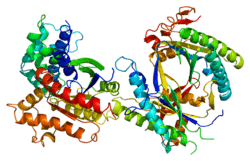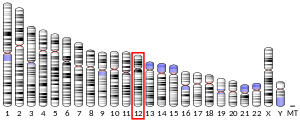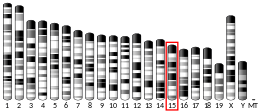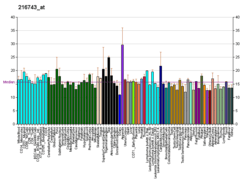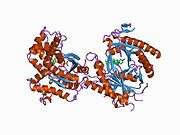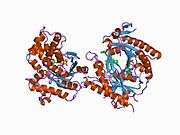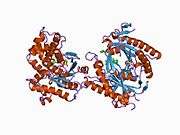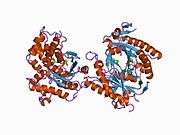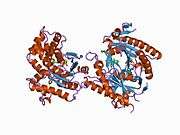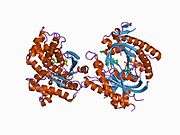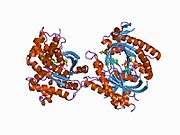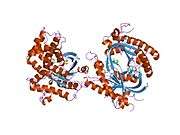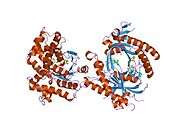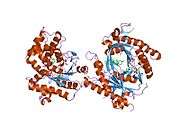ADCY6
Adenylyl cyclase type 6 is an enzyme that in humans is encoded by the ADCY6 gene.[5]
Function
This gene encodes adenylyl cyclase 6, which is a membrane-associated enzyme and catalyzes the formation of the secondary messenger cyclic adenosine monophosphate (cAMP). The expression of this gene is found in normal thyroid and brain tissues, as well as some tumors; and its expression is significantly higher in one hyperfunctioning thyroid tumor than in normal thyroid tissue. Alternative splicing generates 2 transcript variants.[5]
gollark: The wilderness somehow?
gollark: Truly it hides deep secrets.
gollark: There are multiple gemshards in the picture?
gollark: ∆π out of ∞.
gollark: ∞/0
References
- GRCh38: Ensembl release 89: ENSG00000174233 - Ensembl, May 2017
- GRCm38: Ensembl release 89: ENSMUSG00000022994 - Ensembl, May 2017
- "Human PubMed Reference:". National Center for Biotechnology Information, U.S. National Library of Medicine.
- "Mouse PubMed Reference:". National Center for Biotechnology Information, U.S. National Library of Medicine.
- "Entrez Gene: ADCY6 adenylate cyclase 6".
External links
- Human ADCY6 genome location and ADCY6 gene details page in the UCSC Genome Browser.
Further reading
- Nakajima D, Okazaki N, Yamakawa H, et al. (2003). "Construction of expression-ready cDNA clones for KIAA genes: manual curation of 330 KIAA cDNA clones". DNA Res. 9 (3): 99–106. doi:10.1093/dnares/9.3.99. PMID 12168954.
- Gaudin C, Homcy CJ, Ishikawa Y (1994). "Mammalian adenylyl cyclase family members are randomly located on different chromosomes". Hum. Genet. 94 (5): 527–9. doi:10.1007/BF00211020. PMID 7959689.
- Haber N, Stengel D, Defer N, et al. (1994). "Chromosomal mapping of human adenylyl cyclase genes type III, type V and type VI". Hum. Genet. 94 (1): 69–73. doi:10.1007/BF02272844. PMID 8034296.
- Maruyama K, Sugano S (1994). "Oligo-capping: a simple method to replace the cap structure of eukaryotic mRNAs with oligoribonucleotides". Gene. 138 (1–2): 171–4. doi:10.1016/0378-1119(94)90802-8. PMID 8125298.
- Harry A, Chen Y, Magnusson R, et al. (1997). "Differential regulation of adenylyl cyclases by Galphas". J. Biol. Chem. 272 (30): 19017–21. doi:10.1074/jbc.272.30.19017. PMID 9228084.
- Suzuki Y, Yoshitomo-Nakagawa K, Maruyama K, et al. (1997). "Construction and characterization of a full length-enriched and a 5'-end-enriched cDNA library". Gene. 200 (1–2): 149–56. doi:10.1016/S0378-1119(97)00411-3. PMID 9373149.
- Mhaouty-Kodja S, Bouet-Alard R, Limon-Boulez I, et al. (1998). "Molecular diversity of adenylyl cyclases in human and rat myometrium. Correlation with global adenylyl cyclase activity during mid- and term pregnancy". J. Biol. Chem. 272 (49): 31100–6. doi:10.1074/jbc.272.49.31100. PMID 9388262.
- Ishikawa K, Nagase T, Nakajima D, et al. (1998). "Prediction of the coding sequences of unidentified human genes. VIII. 78 new cDNA clones from brain which code for large proteins in vitro". DNA Res. 4 (5): 307–13. doi:10.1093/dnares/4.5.307. PMID 9455477.
- Leech CA, Castonguay MA, Habener JF (1999). "Expression of adenylyl cyclase subtypes in pancreatic beta-cells". Biochem. Biophys. Res. Commun. 254 (3): 703–6. doi:10.1006/bbrc.1998.9906. PMID 9920805.
- Barcova M, Speth C, Kacani L, et al. (1999). "Involvement of adenylate cyclase and p70(S6)-kinase activation in IL-10 up-regulation in human monocytes by gp41 envelope protein of human immunodeficiency virus type 1". Pflügers Arch. 437 (4): 538–46. doi:10.1007/s004240050815. PMID 10089566.
- Raimundo S, Giray J, Volff JN, et al. (1999). "Cloning and sequence of partial cDNAs encoding the human type V and VI adenylyl cyclases and subsequent RNA-quantification in various tissues". Clin. Chim. Acta. 285 (1–2): 155–61. doi:10.1016/S0009-8981(99)00067-4. PMID 10481931.
- Speth C, Joebstl B, Barcova M, Dierich MP (2000). "HIV-1 envelope protein gp41 modulates expression of interleukin-10 and chemokine receptors on monocytes, astrocytes and neurones". AIDS. 14 (6): 629–36. doi:10.1097/00002030-200004140-00001. PMID 10807185.
- Patke CL, Shearer WT (2000). "gp120- and TNF-alpha-induced modulation of human B cell function: proliferation, cyclic AMP generation, Ig production, and B-cell receptor expression". J. Allergy Clin. Immunol. 105 (5): 975–82. doi:10.1067/mai.2000.105315. PMID 10808179.
- Wicker R, Catalan AG, Cailleux A, et al. (2000). "Cloning and expression of human adenylyl cyclase type VI in normal thyroid tissues". Biochim. Biophys. Acta. 1493 (1–2): 279–83. doi:10.1016/s0167-4781(00)00187-1. PMID 10978539.
- Vanvooren V, Allgeier A, Cosson E, et al. (2001). "Expression of multiple adenylyl cyclase isoforms in human and dog thyroid". Mol. Cell. Endocrinol. 170 (1–2): 185–96. doi:10.1016/S0303-7207(00)00322-1. PMID 11162902.
- Patrizio M, Colucci M, Levi G (2001). "Human immunodeficiency virus type 1 Tat protein decreases cyclic AMP synthesis in rat microglia cultures". J. Neurochem. 77 (2): 399–407. doi:10.1046/j.1471-4159.2001.00249.x. PMID 11299302.
- Côté M, Guillon G, Payet MD, Gallo-Payet N (2001). "Expression and regulation of adenylyl cyclase isoforms in the human adrenal gland". J. Clin. Endocrinol. Metab. 86 (9): 4495–503. doi:10.1210/jc.86.9.4495. PMID 11549699.
- Speth C, Schabetsberger T, Mohsenipour I, et al. (2002). "Mechanism of human immunodeficiency virus-induced complement expression in astrocytes and neurons". J. Virol. 76 (7): 3179–88. doi:10.1128/JVI.76.7.3179-3188.2002. PMC 136041. PMID 11884542.
- Strausberg RL, Feingold EA, Grouse LH, et al. (2003). "Generation and initial analysis of more than 15,000 full-length human and mouse cDNA sequences". Proc. Natl. Acad. Sci. U.S.A. 99 (26): 16899–903. doi:10.1073/pnas.242603899. PMC 139241. PMID 12477932.
This article is issued from Wikipedia. The text is licensed under Creative Commons - Attribution - Sharealike. Additional terms may apply for the media files.
